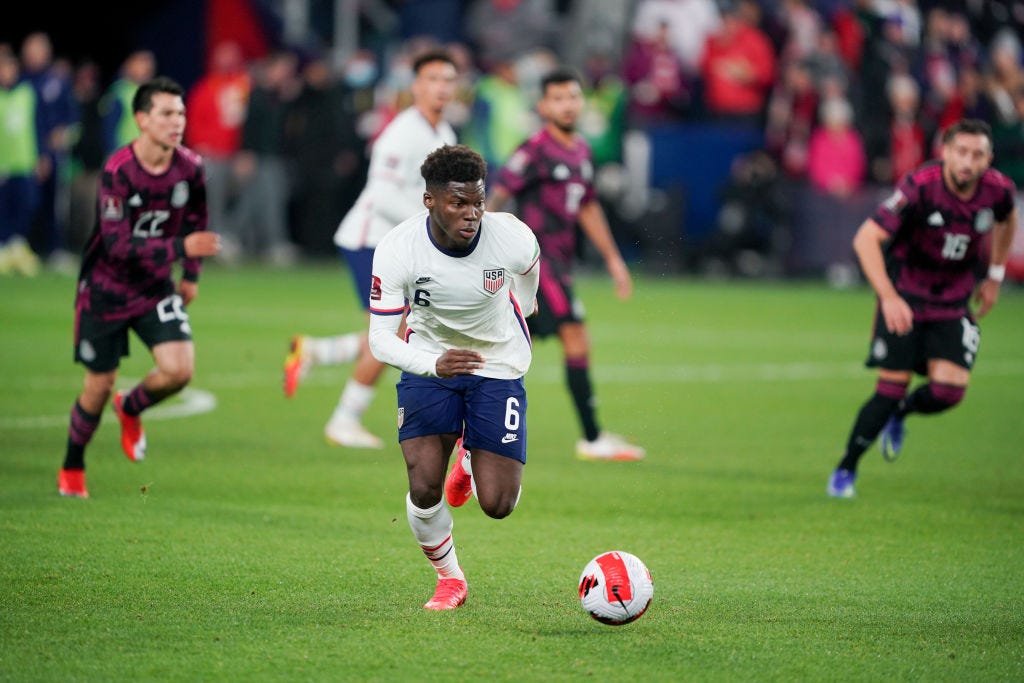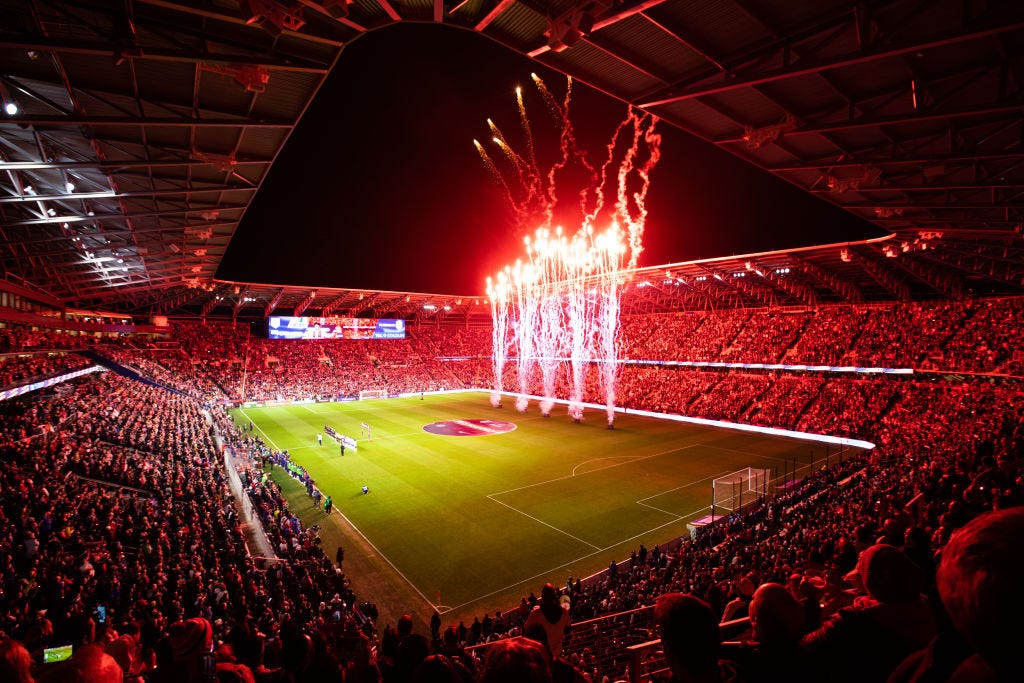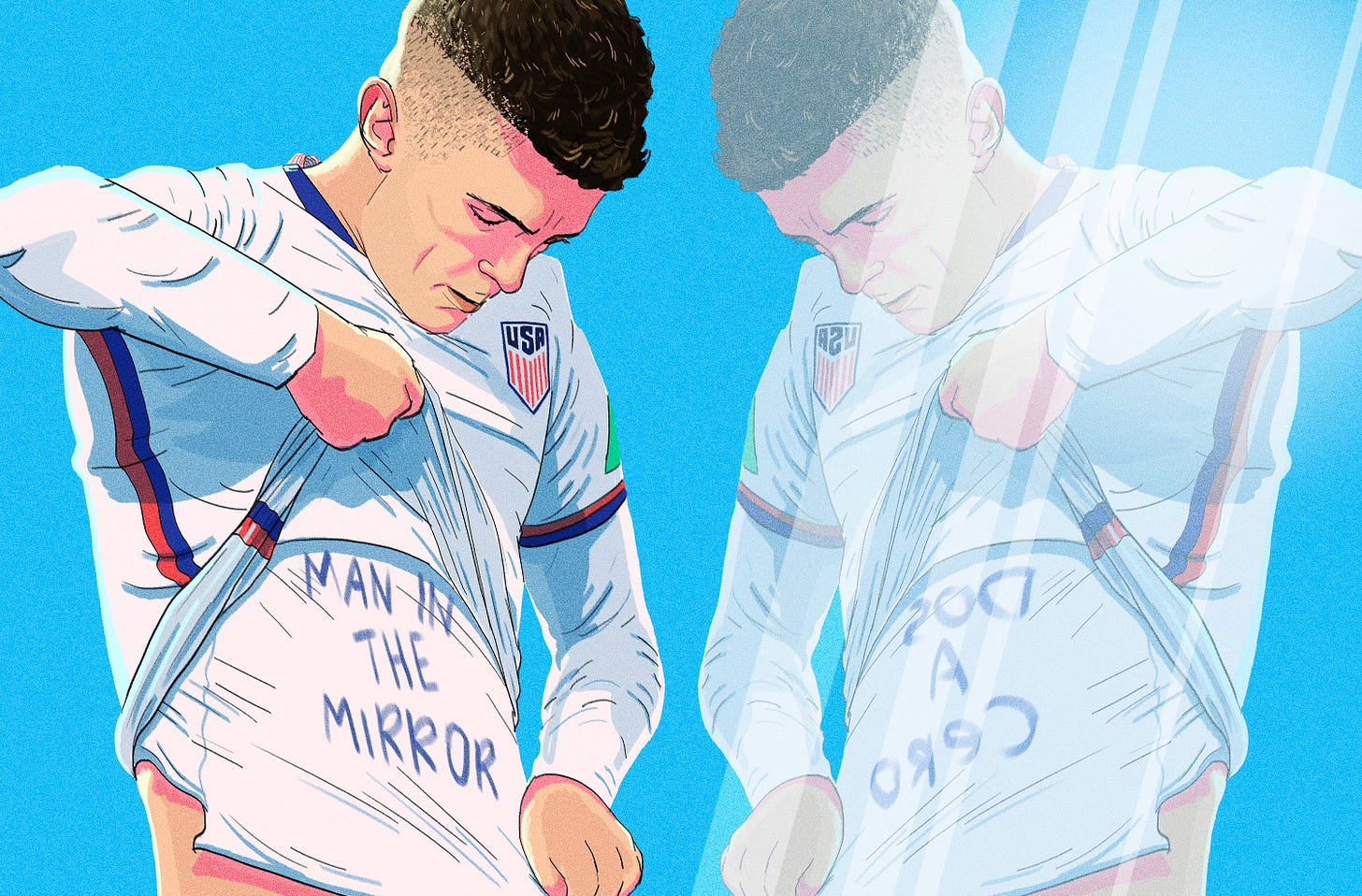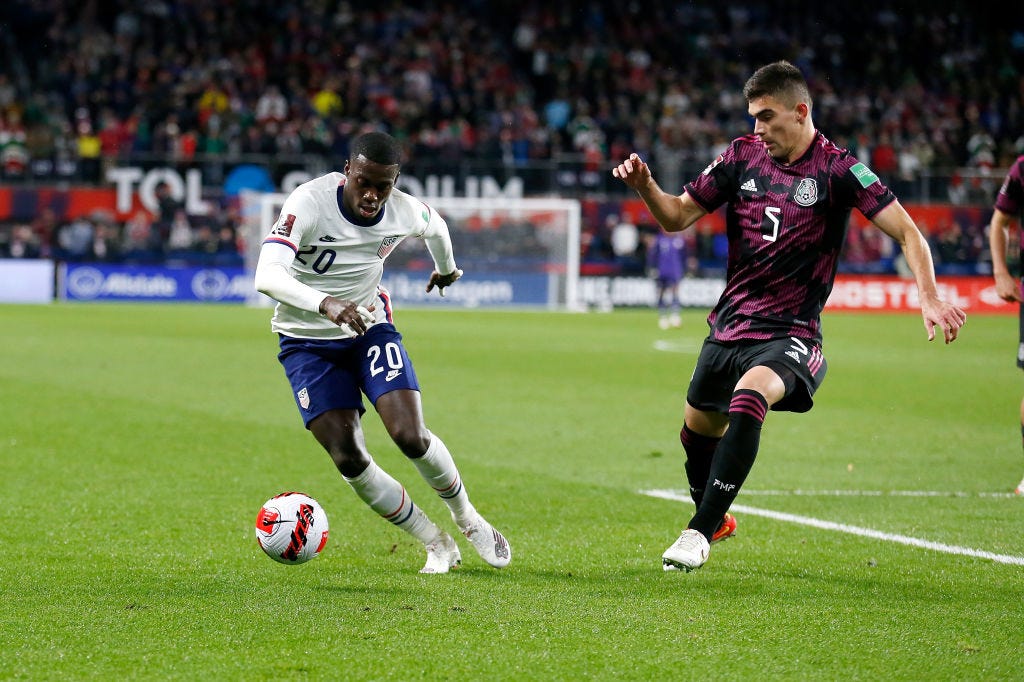Premium: Poor Mexico
USMNT Dumps El Tri Dos a Cero in Third Straight Win Over Archrival, Leaving No Doubt Who are the Kings of CONCACAF in 2021
CINCINNATI — Poor Mexico. The great soccer rival of the U.S. men’s national team came into the summer of 2021 riding a wave of success against Uncle Sam. Eight years had passed since Mexico’s last defeat in an official (non-friendly) competition against the United States. There was no doubt that El Tri had earned its place as the giant of CONCACAF. And then, in the span of five short months, the U.S. faced Mexico three times in competitive games—the Nations League final, the Gold Cup final and Friday’s World Cup qualifier—and won all three.
There’s a new colossus in CONCACAF, to say nothing of a new leader in the Octagonal: The USMNT.
But this U.S. victory, the fifth Dos a Cero win in the last six World Cup qualifiers against Mexico held in Ohio, was different from the ones in the Nations League and Gold Cup. The home team, supported by a pro-U.S. crowd at the sparkling new TQL Stadium, thoroughly controlled the game. The U.S. outshot Mexico 18-8 and enjoyed an expected-goals advantage of 2.17-0.72. A defense anchored by Walker Zimmerman, Miles Robinson and goalkeeper Zack Steffen limited Mexico to few good scoring chances and 90 minutes of otherwise punchless Mexican frustration.
Center back Walker Zimmerman told me he’s the commissioner of a fantasy football league involving 10 USMNT players on both sides of the Atlantic. There are five head-to-head matchups every week, and Zimmerman makes like a sportswriter, penning amusing recaps for each one of them. “I make sure I give them entertaining recaps so they can wake up in their time zone ready to read them,” Zimmerman says. “We had two guys pull out at the last minute. So Sebastian Lletget and Brenden Aaronson, I’m putting you on blast, you can’t commit to a league and then with 20 minutes before draft time they bailed.” He laughs. “But the other 10 guys, it’s been a lot of fun.”
Meanwhile, the U.S. shredded Mexico down the right side in the second half through DeAndre Yedlin and Tim Weah, whose pinpoint cross found second-half substitute Christian Pulisic for the 74th-minute game-winning header.
“We’ve come a long way in the last couple of years,” Pulisic said afterward. “Mexico has always been a tough opponent for us, and to now win three in a row is obviously amazing. That doesn’t mean it’s time to be complacent and time to think we’re the best around. Now it’s focus on Jamaica [on Tuesday]. Just keep going. We want to continue to prove what this team is about and hopefully start to show the world what this national team is capable of.”
Pulisic celebrated his goal, the American star’s second straight game-winner against Mexico, by revealing a t-shirt that read MAN IN THE MIRROR—not a declaration of fandom for the Michael Jackson song, but rather a pointed response to Mexico goalkeeper Guillermo Ochoa, who’d said before the game: “Mexico is the mirror in which the United States wants to see itself.”
In the words of Michael Jordan, the USMNT took that personally. Weah said the night before the game that he and Yedlin asked the team’s kit men to prepare the t-shirt for Pulisic. “It’s just to send a message,” Weah explained afterward. “I think it’s a new era now. Before the game, Mexico was talking a lot of smack. And beating them just shuts them up, and we have to continue to beat them. That’s the only way we’re going to earn their respect and the world’s respect. But I think we’re on a great path right now, and the future is bright.”
Fútbol with Grant Wahl is a reader-supported soccer newsletter. You can sign up below (free or paid) to get my posts in your inbox. The best way to support my work is by taking out a paid subscription.
It was revealing that in their separate press conference appearances after the game, both coaches, Mexico’s Tata Martino and the U.S.’s Gregg Berhalter, used the word intensity in their first statements to describe the factor that made the difference in the game. For Martino, who now finds himself on thin ice following three straight losses to his team’s main rival, he’ll spend the trip to Edmonton for Tuesday’s game at Canada wondering why El Tri was strangely subdued against the Yanks. Yet Berhalter felt he knew why that was the case in the second half: The U.S. exhausted its opponent in the opening 45 minutes.
“We talked before the game about what we’re going to need to be successful,” Berhalter said, “and the starting point was intensity. We wanted to break the rhythm with our pressing and eventually wear them down. The first half in my opinion was an entertaining half. It was back and forth. Both teams were taking shots at each other, But the second half is where we started to pull away, particularly in the first 20 minutes when we just were going. And that’s the effect that we have on opponents when we can press them. We can be that aggressive around the ball, turning them around and making them face their own goal. It becomes really challenging.”

Weah, for his part, has responded to his disappointing play in last month’s loss to Panama with two straight signature games, firing the shot that ended up in the net for the decisive goal against Costa Rica and then torching the Mexican back line during the second half on Friday. Berhalter said Weah’s game relies on his confidence, which has been higher with the national team since meeting with Berhalter after the Panama game to go over the video of his performances.
[Walker] Zimmerman told me he’s the commissioner of a fantasy football league involving 10 USMNT players on both sides of the Atlantic. There are five head-to-head matchups every week, and Zimmerman makes like a sportswriter, penning amusing recaps for each one of them.
Once Pulisic entered the game in the 69th minute, Weah said he knew it could make a difference in the outcome of a game the U.S. was dominating despite the score still being 0-0.
“I’ve been playing with Christian for a while now, since I was 17,” Weah said. “I know that he’s our star player, and he’s always going to be in the right spots, and you just have to deliver the ball to him. When I received the ball from DeAndre, I took a quick glance and saw he was going to make the run in the box. Christian’s super-deadly with those runs in behind, so I knew I just had to put the ball in the right spot, and he was there to knock it in.”
Weston McKennie added a second goal in the 85th minute for the trademark scoreline, a deserving result for the performance that created it. Friday marked the third World Cup qualifier in which the U.S. has started a central midfield of Tyler Adams (22 years old), McKennie (23) and Yunus Musah (18). All three have been victories. The potential of the U.S.’s MMA midfield is intoxicating. This could be the trio that drives the U.S. in the center of the park through World Cup 2026 and beyond.
“I think the most important thing for us when we play together is that we feel like we have really good chemistry, a really good balance and different qualities,” Adams explained the day before the game. “I’m a little bit more holding and a bit more defensive-minded, whereas Yunus and Weston are both really box-to-box. They offer a lot in the attack, they’re both athletic, they win their duels. But particularly Yunus, his ability to take the ball and cover a lot of ground, he breaks so many lines at the same time with his dribbling ability. He won’t lose too many balls, and he keeps the team well-connected between the defense and the offense.”

The sight of Musah at age 18 barreling through defenses on the ball is an image that could scare Mexico for many years. It’s a rare skill, especially for a player who also brings Musah’s size (6-foot, 165 pounds) and strength to the field. During a one-on-one interview on Thursday night, Musah told me that during his formative years he studied Yaya Touré, the game-changing midfielder from Côte d’Ivoire who had so many influential seasons with Manchester City and Barcelona.
“I liked the way that Yaya Touré used to drive past people,” Musah said. “For example, I used to watch a lot of clips of him doing that, and I just want to get better at my game and improve those attributes.”
While serving as a guest columnist for The Athletic during last summer’s Euros, Touré wrote an ode to the benefits of having, shall we say, large posteriors at the highest levels of soccer. It was a convincing argument: Playing in England, Touré contended, required attacking players to withstand the physical shock of defenders crashing into you soon after you receive the ball. Players with big butts—Touré hailed Eden Hazard as a prime example—can handle that kind of defending better. And Musah is well-positioned to appeal to Touré’s tastes, having played in England in the Arsenal youth system and possessing a Hazard-worthy rear end.
He used it extensively against Mexico, causing defenders to bounce off him on more than one occasion before he advanced with the ball. “Yunus was outstanding today,” Berhalter said after the game. “You see the quality, the bravery, the relentlessness. He just keeps going. I thought there were a number of fouls on him that they didn’t call, actually. He’s fit into this group so well, and all of it has to do with him and his mindset.”
It helps, too, that Musah has worked extensively on his skills for the past couple years with USMNT assistant coach Nico Estévez, who used to be on the staff at Valencia (Musah’s current club in Spain). No single figure had a bigger impact on Musah choosing to play for the U.S. over England (which he represented at the youth level) than Estévez, who heard about the New York City-born Musah’s U.S. connection through Valencia contacts and started to build a relationship in which he connected regularly with Musah to review video and discuss the finer aspects of his game.
“Nico and I are always speaking after training sessions and stuff,” says Musah. “He’s helping me out with analyzing my things to improve, helping me out in the U.S. system. He’s kind of a mentor to me.”
Musah didn’t grow up paying attention to the USA-Mexico rivalry, so he brings new eyes and even a sense of wonder to one of the most bitter border wars in international soccer. That hit home for him in June when he was part of the U.S. team that beat Mexico 3-2 in Denver in the CONCACAF Nations League final. At that game, Musah saw a pro-Mexico crowd in a U.S. stadium that booed and whistled the “home” team and heaved cups of beer and other projectiles at the U.S. players after Pulisic scored the game-winning goal.

“It was completely different to a league game in Spain,” he says. “It was a big game, really heated. There were a lot of Mexican fans, which made the atmosphere very toxic, and a high level of competition, basically. The rivalry is crazy, because they want to kick you and want to win at all costs, really, no matter what it takes.”
Having Adams and McKennie with him in the midfield is a huge help for Musah, who struggled without them in the U.S.’s loss at Panama last month. Adams, the USMNT’s most active leader on and off the field, never stops talking and helps direct Musah on where to be and when, and McKennie is the Mayor of Good Times, or as Musah puts it, “one of the guys who makes the vibe of coming to the national team really good.”
“It feels simple to me to play with such great players like them,” Musah continues, “because they make things a bit easier with some of their passes. They talk to me and help me a lot. They’re more experienced than me, so they help me improve my game.”
Musah doesn’t hesitate to say that the positive mood of young players inside the USMNT had a big influence when he made his decision to represent the U.S. earlier this year. That chemistry permeates the team, and players have gone out of their way to keep the European-based players and the U.S.-based players connected even outside international windows.
Center back Zimmerman told me he’s the commissioner of a fantasy football league involving 10 USMNT players on both sides of the Atlantic. There are five head-to-head matchups every week, and Zimmerman makes like a sportswriter, penning amusing recaps for each one of them. “I make sure I give them entertaining recaps so they can wake up in their time zone ready to read them,” Zimmerman says. “We had two guys pull out at the last minute. So Sebastian Lletget and Brenden Aaronson, I’m putting you on blast, you can’t commit to a league and then with 20 minutes before draft time they bailed.” He laughs. “But the other 10 guys, it’s been a lot of fun.”
If Zimmerman were writing a recap of Friday’s game, he’d note that the blond U.S. central defender didn’t put a foot wrong and controlled everything in the air, eliminating the threat of the Mexican center forward Raúl Jiménez. Zimmerman has made himself an essential part of the U.S. squad, which will be important on Tuesday in Jamaica after Miles Robinson was sent off late in Friday’s game with his second yellow card.
The U.S. will also be missing McKennie on a yellow card suspension, which left Berhalter contemplating bringing reinforcements into camp before the team flies to Kingston on Sunday. “That is something we’ve considered,” Berhalter said after the game. “For us, it’s about how quickly can we get back down to ground and get focused on what the next task is. We want to turn around and have a strong performance in Jamaica.”
Berhalter knows as well as anyone that the U.S. wants to avoid a repeat of the letdown loss in Panama last month after a home victory against the Jamaicans. A clash with the Reggae Boyz at The Office awaits.







“Trademark” win for the US, as you say, and a trademark piece by you, Grant. Went to bed late Friday night excited for your take to arrive in my inbox this morning. Hell of a game (hell of a half!) for the USMNT’s most important win in eight years.
I remember the U.S. being in complete control of the 05, 09 and 13 qualifiers in Columbus, too (01 a bit more of a tussle, but great goals!). This was a breakthrough night for this group, indeed, but hopefully historically folks can realize the U.S. has played good soccer before Friday.